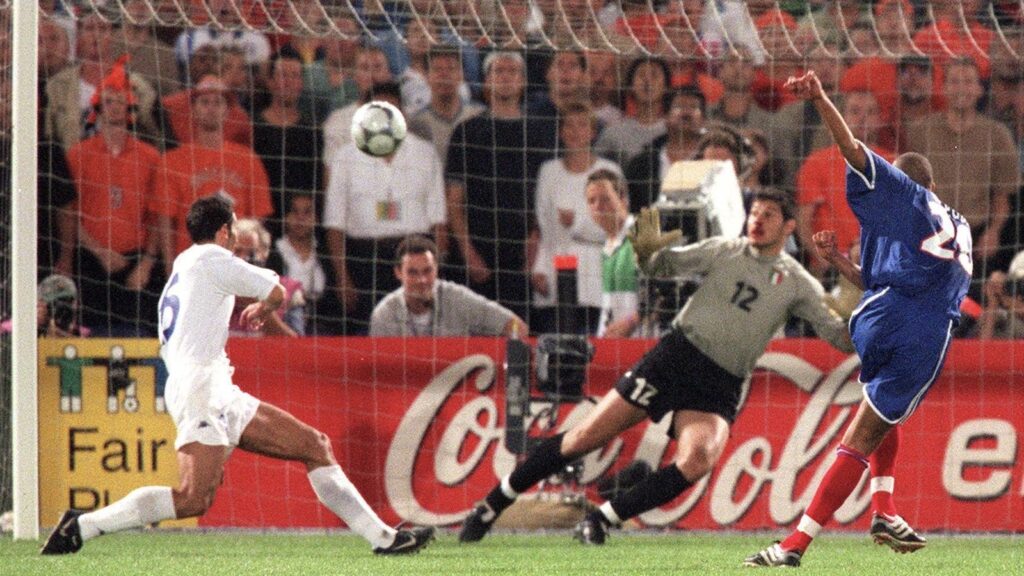The UEFA Euro 2000 Final was, without a doubt, one of the most thrilling and unforgettable chapters in the annals of international football. The showdown occurred on the 2nd of July, 2000, in Rotterdam, Netherlands, and saw two giants with a long and proud footballing history in a show of giant combat: France and Italy.
What made the final very special was that the golden goal was in effect: the first team to score in extra time would win the match. That rule, however, had rarely been applied in the finals of major tournaments, and Euro 2000 did give the spectators a memory as France had won with an equalizer in the last minute and a sudden-death goal for the ages.
Let’s rewind through all the magic, heartbreak, and eerie moments that make this final a legendary affair.
What Was the Golden Goal Rule?
Set up by FIFA in the 1990s, the golden goal was created purportedly to bring some excitement to extra time. Under this system, if a team scored an extra-time goal, the match would instantly finish-the very same way the “sudden death” rule does in other sports.
This was to encourage attacking play and avoid the game going into penalties. However, the rule was controversial and was eventually abolished in 2004. But before that, it decided one of the most thrilling European Championship finals – Euro 2000.
The Road to the Final: France and Italy
Both France and Italy had strong squads coming into the tournament. Going into the Championships, France was the defending 1998 World Cup champion with stars like Zidane, Henry, Vieira, and Deschamps. This combination of years and youth put them ahead of everybody else. Italy had a very stout defense with Maldini, Cannavaro, and Nesta. Up front, players like Francesco Totti and Marco Delvecchio brought creativity and flair.
France reached the final by defeating Portugal in the semi-finals, courtesy of another golden goal penalty by Zidane. Italy made it to the final by defeating the Netherlands on penalties after a goalless draw in their semi-final match, where they played much of the game with ten men.
The Final Match: France vs Italy
With more than 50,000 spectators inside De Kuip Stadium in Rotterdam, the final was fought fiercely from start to finish as both teams displayed themselves.
First Half: A Closely Contested Battle
The first half was a bit balanced and even-like. France had more possession, with Zidane dictating affairs from midfield, while Italy tried to threaten on the counterattack. Neither side could break the deadlock, and the score remained goalless at the break.
Second Half: Italy Takes the Lead
In the 55th minute, Italy scored. Gianluca Pessotto‘s low cross was flicked on by Francesco Totti and tidily finished by Marco Delvecchio, giving Italy a 1–0 lead.
Italy defended with their typical discipline, frustrating France’s attackers. Fabio Cannavaro and Paolo Maldini were superb at keeping Henry and David Trezeguet quiet. As the clock wound down, it appeared that Italy would be crowned champions.
Injury Time Drama: Wiltord’s Equalizer
But football can be cruel. And magical. In the 94th minute, with almost the last kick of regular time, France equalised. Sylvain Wiltord got the ball on the left side of the penalty area and struck a low left-footed shot past Francesco Toldo to score at the near post. The ball slid under Toldo and into the net.
It was 1–1. France had saved the game from the jaws of defeat, and the match went into extra time.
Golden Goal Glory: Trezeguet’s Golden Moment
With the golden goal rule in effect, the stakes were immense – any goal would end the match immediately. Boosted by their equalizer, France pressed forward. Italy, shocked and exhausted, tried to resist. Then came the moment that cemented the outcome of the tournament.
In the 103rd minute, French midfielder Robert Pirès made a superb run down the left wing. He dribbled past his marker and cut the ball back to the middle of the box. David Trezeguet was waiting, and he struck the ball for the first time with his left foot. The ball flew into the roof of the net. Goal. Game over. France was the champion.
The French players and fans erupted in joy. The Italians dropped to the ground in disbelief. That goal had brought one of the most dramatic conclusions to a final in football history.
The Euro 2000 final is remembered as one of the greatest European Championship finals for several reasons. France also became the first team to win both the World Cup (1998) and the European Championship (2000) since West Germany in 1972 and 1974. It confirmed their status as the dominant team of that era.
Aftermath and Legacy
For France, the triumph solidified their “golden generation.” Zidane, Deschamps, Henry and Trezeguet all became national icons. For Italy, the defeat was heartbreaking. They were seconds away from victory, and the unexpected loss shocked both players and fans. But just six years later, they would go on to win the 2006 FIFA World Cup.
The Euro 2000 final also triggered a debate about the golden goal rule. While this created drama, critics said it was too harsh because it gave the other team no chance to respond. UEFA and FIFA subsequently opted for the standard 90-minute setup with extra time and penalties in knockout matches if needed.
A Golden Moment in Football History
The Euro 2000 final was more than just a match. It was an epic tale of resistance and drama. France’s golden goal showed why football is known as “the beautiful game.”
In a match filled with world-class players, tactical battles, and emotional stakes, it was David Trezeguet’s left-foot volley that decided the outcome and made history. The golden goal is long gone, but its legacy remains of one of the greatest finals ever.
